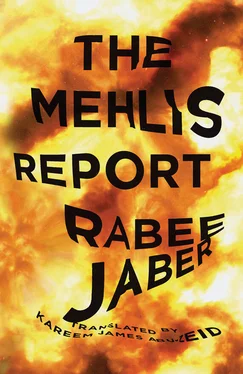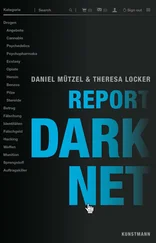Rabee Jaber
The Mehlis Report
Saman Yarid has three sisters: Josephine, Mary, and Emily. Josephine was kidnapped in 1983 on the demarcation line between East and West Beirut. Mary lives in Baltimore; Emily in Paris. Mary’s husband is her cousin Hana Yarid. The two of them obtained special permission from the archbishop and got married. They crossed the Atlantic in 1984 and were blessed with four children: Salman, Ilya, Joseph, and Thomas. Across from the Maronite Church in Baltimore, they opened a Lebanese restaurant as well as a bakery next door that sells pita bread and different types of manakish sandwiches: minced lamb, dried yogurt and bulgur, thyme. Emily is a translator at UNESCO. Her husband is French. He’s an administrator at the Paris II University (Assas). They own an apartment in an old building on Rue Georges Saché in the 14th arrondissement, and have two children: Annie and Jack. Blond and blue-eyed, Annie resembles her father, Charles Crubellier; Jack has black eyes and dark skin — the legacy of all the Middle Eastern ancestors he has never known.
These days Saman Yarid directs the Yarid Architecture and Design Agency. The company occupies the third floor of the Istral building, constructed in 1931 and located downtown, in the middle of Beirut’s commercial district. Saman Yarid doesn’t know why he stays — his associates (i.e., his relatives) have all left the city in waves. He comes into his office now to avoid sitting alone in the vast rooms of the family home on Ghandour al-Saad Street (near the Jesuit University, in the East Beirut district of Achrafieh).
“I’m forty now,” reflects Saman Yarid, “and I’ve done nothing with my life.” Heavy burdens lie on his heart — dark thoughts and feelings intensify, then recede. Recently, after the series of explosions and the return of tension to the country, he’s started having panic attacks he cannot understand.
His sister Emily has been writing him emails. When will he leave Beirut, she asks him, and the harrowing life there? Since February 14th, since the explosion in front of the doomed Saint Georges Hotel, she’s been sending him an email every day or two.
And he’s been replying with short sentences in French to her emails. Or he uses that foreign alphabet to write in Arabic. The people of Achrafieh know French better than Arabic. But in French he makes grammatical errors. He prefers Arabic. He spends the morning hours in front of the blue computer screen. He’s become accustomed to reading the local newspapers — and the international ones — online. He reads the news and sends short emails to friends within the city, and to friends outside. Friends and lovers. His short fingers are somewhat plump, even though he watches his diet. He drinks his coffee and looks out the window at the pigeons flying between the buildings and minarets. At the company he has kept on two employees. The tall one is adept at making coffee. The short one is useless. He doesn’t know what she does — eight hours every day.
On the morning of June 2nd, a head peeped around his office door, and her face was pale: “They killed Samir Kassir.”
As he linked the name with a memory of something deep in his mind, his eyes clouded over for a moment. He knew that name. Yes. And he knew the man’s face. Their paths had often crossed, here, downtown, and he had often noticed him. He recognized his face from the TV and the papers. During the protests last March, as the public squares surged with people in revolt, he’d also seen him give speeches. Yes, in a very short span of time, he had seen him quite a bit lately. a strange coincidence. He had seen Kassir here, in front of the fountains by the Municipality Building, after the huge demonstration in the middle of March. And then at Parliament Square (the Place de l’Étoile ). And then at the Étoile restaurant in that same square two or three days later — it had been a Friday. Saman only goes to that restaurant on Fridays. Because of the fish plate: rice with stewed fish and onions. An old habit — on Fridays he always eats at the Étoile or the Balthus.
“They blew up his car. In front of his home on Furn al-Hayek Street, the La Rose building.”
This time it was the tall employee who was speaking. He had no connection to either of them. He had inherited her — the tall one — from an associate. He didn’t know who had hired the other one, the short one. Maybe she’d come with the building. He didn’t know. In fact, if anyone ever asked him what he does in this office, he’d say: I drink coffee.
He drinks coffee, and when he gets tired of sitting, he goes out for a walk. He goes out and visits friends. In the middle of the day, he calls one of his girlfriends, or goes home.
“The La Rose building. In front of the Black Tulip.”
At that moment, Saman Yarid recalled that three times in the past month they’d crossed paths. He had twice seen that man on Maarad Street: once standing on the sidewalk in front of the BLOM bank, and once at the entrance to the Caspar & Gambini restaurant. That second time, Kassir was walking out of the restaurant, and its glass door almost slammed Saman Yarid in the face. The third and final time, when was it? Last weekend? He tried to remember. He’d been crossing Abd al-Wahab al-Inglizi Street, carrying a bag of nuts he’d bought from Al-Rifai, here, right by the office — when was that? Thursday? Friday? — and saw Kassir standing in front of the Al Dente restaurant working at his teeth with a toothpick. But no, he wasn’t cleaning his teeth: he was playing with the toothpick between his lips, and he seemed happy. Saman remembered the man’s neatly trimmed gray beard. He remembered his blue shirt, the top button undone, but he didn’t know why he’d greeted him. The man looked familiar, probably from TV, and maybe that’s why Saman had greeted him. And that man who wrote in the papers and gave speeches at the protests returned his greeting and smiled.
It’s autumn now. Saman Yarid crosses Furn al-Hayek Street and sees the Sukleen Company workers sweeping the sycamore figs off the sidewalk. The road turns here, and the trees bury it in thick shadows. His grandmother on his father’s side had often told him about the old neighborhood, when the Achrafieh resounded with flocks of sparrows chirping in the sycamores. Achrafieh was like a forest back then. Saman Yarid crosses in front of the Black Tulip store, following the road, and ascending toward Sassine Square. But before reaching the square, and just after passing the ABC Mall, he turns down a side street, goes into the third building on the right, and takes the elevator to the top floor. He rings the bell, and the door opens. The woman standing in the doorway answers his smile with one of her own. Her name is Cecilia.
It’s autumn now. The ants are hatching and blanketing Beirut’s flagstones, raiding its homes. Emily sends her brother letters. She’s heard about the explosions in Beirut, and is afraid. All the explosions are happening in East Beirut. Her fear redoubled after the explosion in the Geitawi neighborhood. That was the third one in East Beirut. The first explosion was on Furn al-Hayek Street. The second on Rue Huvelin (the windows must have shattered on Ghandour al-Saad Street). And that third one was in Geitawi, where their aunt used to live years ago. Emily writes to Saman from Paris: when, she asks him, will he finally leave Beirut? What is he waiting for? Why doesn’t he just leave the country? When will he go?
“I haven’t decided yet,” he replies. “I’m waiting for the Mehlis Report.”
A French magazine lies open on the kitchen table.
Читать дальше












